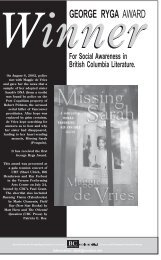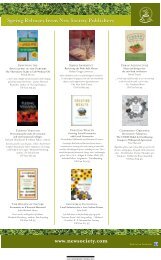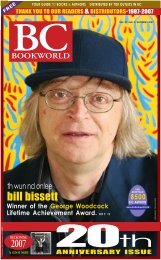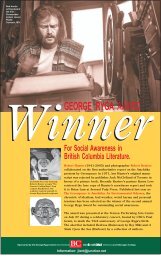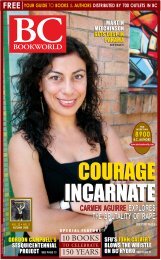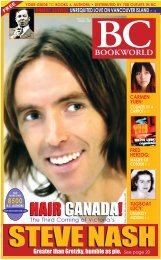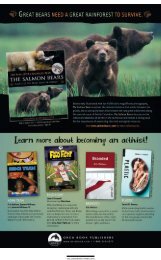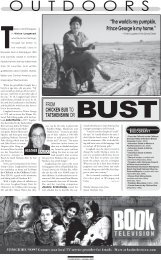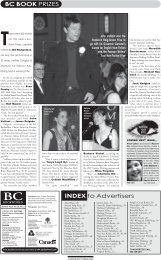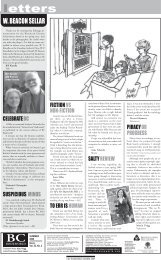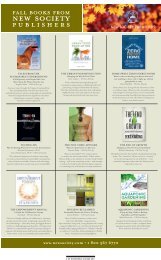Spring 2008 Volume 22 - No. 1 - BC BookWorld
Spring 2008 Volume 22 - No. 1 - BC BookWorld
Spring 2008 Volume 22 - No. 1 - BC BookWorld
- No tags were found...
Create successful ePaper yourself
Turn your PDF publications into a flip-book with our unique Google optimized e-Paper software.
24 BOOKWORLD • LOOKOUT • SPRING • <strong>2008</strong>REMEMBERING JANE RULEcontinued from previous pageIn 1964, Macmillan in Englandpublished Desert of the Heart after it wasrejected <strong>22</strong> times in the United States.Jane Rule immediately became “Canada'sonly visible lesbian” and risked losingher job at the university. She oftennoted that one argument made in herdefence at the time was that not everyauthor of a murder mystery novel is necessarilya murderer. Canada’s laws werechanged to no longer prohibit homosexualacts between consenting adultsthat same year but prior to the appearanceof Desert of the Heart, in her words,“we were jailable.”The novel had been completed by1961, just prior to Rule’s 30th birthday.Although Macmillan was concernedabout the possibility of an adverse reactionby Nevada casino employees, verylittle substantive editing was done on themanuscript. Rule never resided in Reno,Nevada, but her parents did, enablingher to get to know the city during severalvisits during which her younger sistertook her to various sites. Rule onlyworked in a casino for six nights as achange girl, from 7 p.m. to 3 a.m., andshe had little interest in gambling.Jane Rule moved to Galiano Islandin 1976, coincidental with her first attackof chronic and crippling arthritisin her spine. As a senior member of aclosely-knit community, she soon becamean integral, supportive figure,lending money, providing guidance,etc., and gaining the nickname “thebank of Galiano.”A resolve to forge community andgroup connections was reflected in herfiction, dating back to This Is <strong>No</strong>t ForYou, a novel about college friendships.Memory Board and After the Fire are primarilyconcerned with divergent personalitieswho accept communitybonds, incorporating the elderly as centralcharacters. The Young In One Another’sArms and Contract with the Worldare similarly concerned with mutualcompassion and love born of strength,not weakness. The latter concerns thedifficulties faced by a variety of artistsas they approach middle age withouthaving gained much outward success.Admired and befriended by the likesof Kate Millet and MargaretAtwood, Rule became knownthroughout the world as one of Canada’smost articulate spokeswomen on issuespertaining to personal freedom andsocial responsibility, but she never clamouredfor the limelight.“Politics really are to clean up thehouse,” she says. “You have to do itevery week. I don't find it interesting,just as I don’t find sweeping the floorevery week interesting. I do it. I vote...I prefer to work wherever there’s a possibilityof changing things... I really believethrough the counter-movementsin society change can be made. We’reliving witnesses of it.”As someone who views marriage asproblematic because individuals shouldnot require permission from the statein order to cohabit, Rule lookedaskance at the eagerness of gay colleaguesto gain the legal right to marry.“A lot of us old guard feel very dubiousabout it,” she said.Jane Rule with David Robinson and Audrey ThomasHelen Sonthoff and Jane RuleJane Rule’s testimony in the SupremeCourt of B.C. on behalf of Little Sister’sBook and Art Emporium on October24, 1994, during a constitutionalchallenge to Canada Customs’ practiceof seizing materials destined specificallyfor a gay and lesbian bookstore, was publishedas Detained at Customs: Jane RuleTestifies at the Little Sister's Trial (LazaraPress, 1995). Specifically, Rule was respondingto the seizure by Canada Customsofficials of her novels The Young InOne Another’s Arms and Contract Withthe World, as well as the movie version ofDesert of the Heart—a 1985 feature filmdirected by Donna Deitch and starringHelen Shaver, PatriciaCharbonneau and AudraLindley.Interviewed by Xtra West magazine,Little Sister’s co-owner Jim Deva recalledthe importance of Rule’s galvanizingtestimony that day: “She was in awheelchair at that time and I got the honourof wheeling her up to the stand. As Iwas rolling her up and looking at thejudge it was like, ‘You know this is a veryimportant person. You listen to this person.’That’s what I was trying to project.‘This is the best we have. If you cannotunderstand our community, listen to thiswoman and she’ll explain our communityto you.’ She spoke very quietly, veryeloquently. I think her testimony reallydid help make that judge realize that wereally were talking about our communityand how censorship is so offensive, sodeeply offensive. Before that, I don'tthink he really understood it.”Jane Rule:“I also think that a relationshipbased on sexual fidelityis silly. I don’t haveanything against sexual fidelity,but... making sexualitythe one commitmentthat you give to the otherperson seems archaicand goes back to menowning women andwanting to know that theirchildren are their own.”— from an interview conductedby Joanne Bealy, July, 14, 2006.Having written for mainstreammagazines such as Chatelaine andRedbook, as well as the lesbian journalThe Ladder back in the 1960s, Rule beganwriting a column called So’s YourGrandmother for the Toronto-based gaynewspaper The Body Politic after its officeswere raided in December of 1977by Operation P, an anti-pornographyunit that charged the publication forits series on intergenerational relationships,specifically a piece called MenLoving Boys Loving Men. During her tenyears of contributing to the paper, shemaintained a lively correspondencewith editor Rick Bebout.Still widely known for her groundbreakingnovel Desert of the Heart, Ruleis the subject of a Genie-awarding winningdocumentary, Fiction and OtherTruths; A Film about Jane Rule, made byAerlyn Weissman and LynneFerney in 1995. She has also receivedthe Canadian Authors Association bestnovel and best short story awards, theAmerican Gay Academic LiteratureAward, the U.S. Fund for Human DignityAward of Merit, the CNIB’s TalkingBook of the Year Award and anhonorary doctorate from U.B.C.Rule consistently encouraged andsupported other artists and would-beartists, including students from thenearby Galiano Island Film and TelevisionSchool. During her illness, Rule offeredher final collection of short essays,Loving the Difficult, to Hedgerow Press,the imprint of neophyte publisherJoan Coldwell.A heavy smoker and avid drinker,Jane Rule died, with strength and dignity,of liver cancer complications on<strong>No</strong>vember 27, 2007, in the same roomin which she and Helen Sonthoff hadfirst slept when they came to Galianoin the mid-1970s. Initially she hadwanted to leave the island for palliativecare in Vancouver, alleviating others ofthe task of caring for her, but she waspersuaded to remain on Galiano wherelocal physician Dr. David Beaveroversaw the round-the-clock care thatwas provided by Rule’s niece and hergay partner—both named Allison—who inherited the house.“I have no ambition to live to a greatage,” she told Douglas Todd in1994. “I think old age is for the pits. I’veseen it. To outlive your usefulness is notto me a great thing.”Many of her comments during herfinal illness were typically funny. Shestaunchly avoided all malarkey about lifeafter death. “Don't say I ‘passed away’ or‘passed on,’” she joked, “or I'll come backand haunt you.”A jam-packed memorial gatheringwas held at the Galiano CommunityHall on Sunday, December 9, 2007during which friends, relatives and admirersrecalled her personality. Her literaryexecutor and close friendShelagh Day praised her “enormoussocial appetite.” SvendRobinson sent condolences fromFrance; former Lieutenant GovernorIona Campagnolo, whose grandfatherhad helped build the hall, sent amessage praising Rule as “a remarkablycourageous role model.” Other commentsincluded:• “Jinx was the most generous,wise, quick-witted and loving personI’ve ever met.”—Libby Walker,Jane Rule's younger sister• “What a wonderful, wonderfulwoman. Wow.”—The Reverend Margaret Edgar• “Jane made an excellent boss. Shemade me feel important and respected.To clean the pool, she paid $10 an hourfor 15 minutes of work at age 11.”—Zack Morrison, local youth• “She taught me how to live a life thatmattered. Jane Rule is the tallest tree onGaliano Island.”— Judy Baca, artist• “What she most believed in wasfreedom—freedom of speech andfreedom to love who you liked.Jane is a beacon in dark times.She was generous. She had quite aninsight into human nature. I would liketo thank you, Jane, for all the laughter.—Margaret Griffiths• “She asked the important questionsand let people hear their own answers.”Ken Bebout, Body Politic editor• “There’s dinosaurs. There’s theRomans. And there’s Jane and Helen.The times we shared are priceless.”—Eli, Jane Rule’s nephew• “Jane’s gift was her enormous humancuriosity. Jane loved many people. Sheloved each of us freely and uniquely.”—Shelagh DayAbove the stage for the memorialgathering, Rule’s own words wereposted for all to see: “I hope I’m rememberedfor being lusty and feisty and fullof life.”



